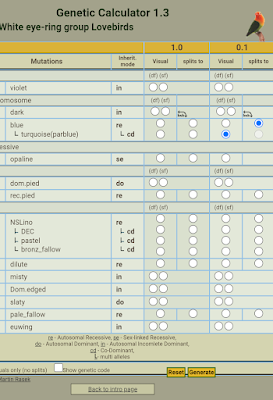How to use lovebirds genetic calculator.
How to use a lovebirds genetic
calculator. Genetic calculators are tools that help predict the outcomes of
breeding different color mutations in lovebirds. They are particularly useful
for breeders who want to understand the potential offspring colors and traits
from specific pairings.
Steps to Use a Lovebirds Genetic
Calculator
- Select the Species:
- Choose the specific species of
lovebird you are working with, such as Fischer's Lovebird (Agapornis
fischeri), Masked Lovebird (Agapornis personatus), or Peach-faced
Lovebird (Agapornis roseicollis).
- Enter Parental Mutations:
- Input the mutations of the male
and female lovebirds. For example, you might select "Green
Opaline" for the male and "Creamino" for the female.
- Some calculators allow you to
enter multiple mutations if the birds carry more than one (e.g., split
for a specific mutation).
- Calculate the Results:
- After entering the parental
mutations, click on the calculate or similar button.
- The calculator will process the
genetic information and display the possible outcomes.
- Review the Results:
- The results will show the
potential genetic make-up and phenotypes of the offspring.
- You may see a list of possible
color mutations, along with the percentages indicating the likelihood of
each type of offspring.
Example Using a Hypothetical
Calculator
Let's walk through an example of
pairing a Green Opaline Fischer's Lovebird with a Creamino Fischer's Lovebird:
- Select Species:
Fischer's Lovebird (Agapornis fischeri).
- Enter Male Mutation:
- Select "Green" as the
base color.
- Choose "Opaline" as
the mutation.
- Enter Female Mutation:
- Select "Creamino"
(which is a combination of Lutino and Blue).
- Calculate the Results:
- Click "Calculate".
- Review the Results:
- The calculator might show
results like:
- 25% Green (Split Opaline, Split
Creamino)
- 25% Green Opaline (Split
Creamino)
- 25% Lutino (Split Blue, Split
Opaline)
- 25% Opaline Lutino (Split Blue)
Practical Considerations
- Accuracy: While genetic calculators
provide a good estimate, actual results can vary due to factors like
incomplete dominance and other genetic complexities.
- Understanding Splits: Knowing the concept of
"split" is crucial. A bird that is split for a mutation carries
the gene without expressing it visually.
- Ethical Breeding: Use the calculator as part of
an ethical breeding program, ensuring the health and well-being of the
birds.
Tools and Resources
- Genetic Calculators: Websites like Lovebird Genetics Calculator or Parrot
Genetics Calculator offer these tools.
- Breeding Guides: Reference materials such as
Dirk Van den Abeele's Lovebirds Compendium provide detailed genetic
information and breeding tips.
By using these tools and resources, you can better understand and predict the outcomes of your lovebird breeding projects.
Popular pairings.
Lattest updates.
The latest updates to lovebird genetic
calculators have brought improved functionality and user experience for
breeders and enthusiasts. Tools like the one provided by the African Love Bird
Society and Gencalc.com are designed to help predict the color and trait
outcomes of lovebird pairings based on their genetic profiles.
African Love Bird Society Calculator:
This tool is particularly focused on Eye-Ring Lovebirds, allowing users
to input various genetic traits to see potential outcomes. It’s a valuable
resource for breeders aiming to understand and plan their breeding strategies
to achieve specific color mutations (GeneTherapy).
Gencalc.com:
Gencalc provides a comprehensive platform for calculating genetic
outcomes in a variety of bird species, including lovebirds. This tool supports
multiple traits and mutations, making it versatile for detailed breeding plans.
It offers an intuitive interface where users can select the species, input the
genetic information of the parent birds, and receive predictions on the
offspring’s characteristics (GenCalc).
These calculators are essential for
anyone involved in lovebird breeding, as they simplify the complex genetics
involved and help predict the appearance of future generations. They aid in
making informed decisions to achieve desired traits, ensuring healthy and
vibrant lovebird populations.
For more detailed information and to
use these tools, you can visit:
- African Love Bird Society
Genetics Calculator
- Gencalc


.jpeg)












.png)
.png)













0 Comments